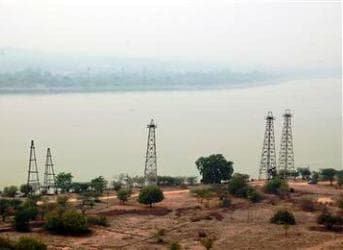Since Burma’s junta in March 2001 allowed a nominally civilian government led by President Thein Sein, who had previously served as a general and then prime minister under the junta, Western governments and energy companies have been flocking to the previously isolated country. U.S. Secretary of State Hillary Clinton made a landmark visit to Burma in December 2011, and the newly re-elected President Obama followed suit in November 2012, underlining Burma's return to the world stage.
Burma’s (also known as Myanmar after the junta changed the country’s name in 1989, a fact that the U.S. State Department declines to recognize) reemergence on the global energy stage is still so recent that the U.S. government’s Energy Information Agency has yet to issue a “Country Analysis Brief” on the nation.
But all that has changed with the arrival of “democracy,” prior to which the only Western company willing to brave dealing with the junta and worldwide opprobrium was France’s Total, which had been in Burma since 1992, pre-dating international sanctions, operating the Yadana gas field. In a sign of how times have changed, according to Minister Than Htay, at the September 2012 2nd Myanmar Oil, Gas and Power conference “Many multinational petroleum companies including Shell, BP, BG ConocoPhillips, Chevron and many others showed great enthusiasm to invest and keen interest to conduct upstream petroleum exploration in Myanmar’s petroleum sector.”
Related article: Does 2013 Herald an Oil Supply Crisis?
Why might China have an edge in Burma? For a start, as recently as last August the U.S. State Department’s “Background Notes, “U.S. Relations With Burma,” Bureau of East Asian and Pacific Affairs Fact Sheet noted, “The United States continues to maintain a ban on all imports from Burma…” a number of which were only lifted prior to Obama’s visit. Besides the U.S., the EU and Canada also imposed economic sanctions on Burma, leaving among the major economies only China, India and South Korea to make significant investments in the country.
China is the biggest foreign investor in Burma with pledges that exceeded $14 billion in the financial year ending in March 2011, according to official data, which is underwriting several multi-billion dollar pipeline projects among other things.
The crown jewel of China’s infrastructure investment projects are twin oil and natural gas 684 mile-long pipelines, running from Burma’s offshore Shwe natural gas fields, discovered in 2004, via Kyaukpyu port to enter China at Ruili in Yunnan province. The oil pipeline, estimated to cost $1.5 billion, can transit 22 million tons annually, while the $1.04 billion natural gas pipeline will shift 12 billion cubic meters per year. Three years after the Shwe field was discovered the Chinese National Petroleum Company was awarded a 30 year agreement to develop it.
Related article: The Energy Industry is Not Safe in North Africa
Needless to say Washington, even while sanctioning the Burmese junta, watched Beijing’s growing investment with concern, particularly those with a “dual purpose” military use. Among the projects rattling the Pentagon are China’s investment in constructing deep-water port facilities capable of berthing warships at Kyaukpyu on the northwestern coast of Yanbye Island on Combermere Bay in the Bay of Bengal, site of the tandem pipelines, while Chinese engineers dredge Burma's Irrawaddy River to give China a usable waterway connecting Yunnan province to the Bay of Bengal. The pipelines have a strategic purpose, as they will allow Chinese maritime shipments of Middle East to transit the Indian Ocean instead of the riskier Strait of Malacca, where 82 percent of Chinese oil imports currently travel.
And oh, since the 1990s, Burma has been one of the top three recipients of Chinese arms exports.
So, as Western executives jet back from energy conferences in Burma, pondering the secrets of Chinese success there, they might consider the following trio of possibilities. One, no hectoring human rights lectures of pesky sanctions. Two, arms sales and three, big cash upfront for projects.
No so difficult to understand, really.
By. John C.K. Daly of Oilprice.com


















